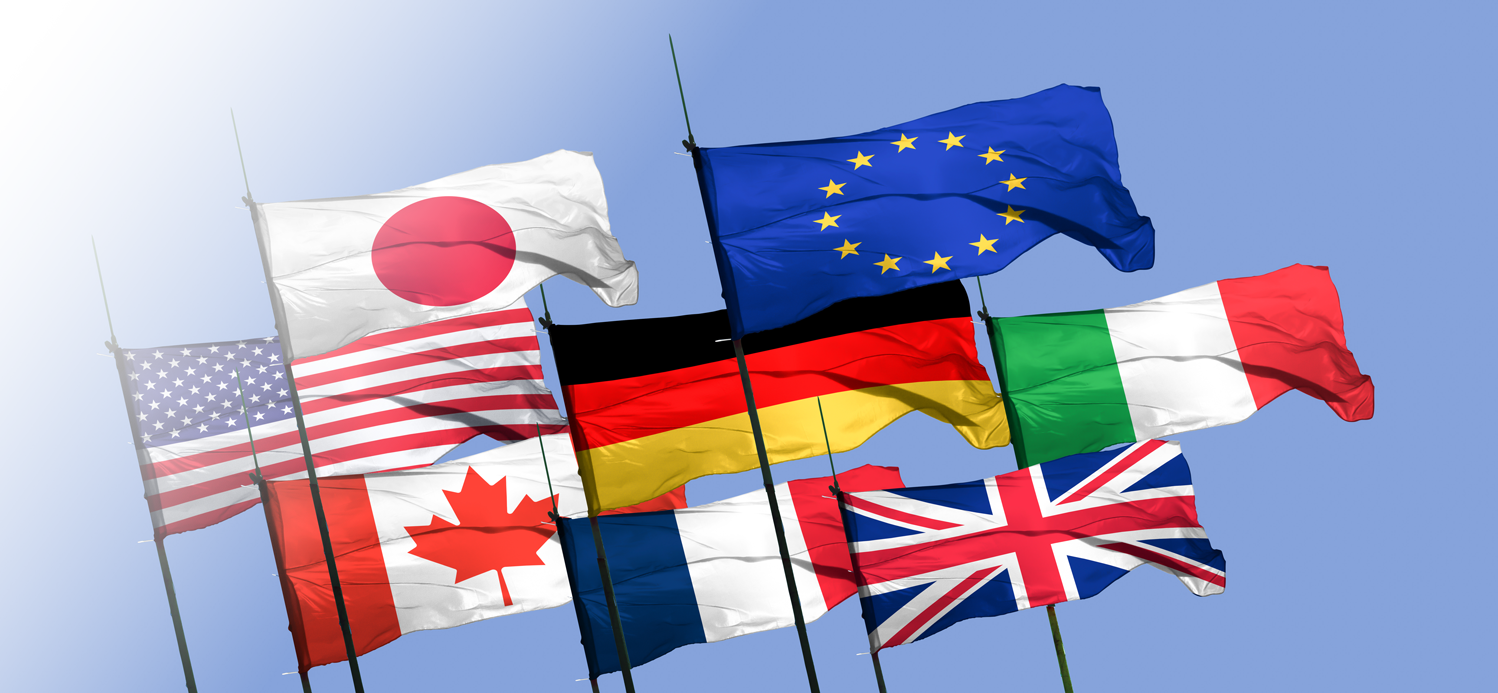

51st G7 Summit
Kananaskis, Canada
15-17 June 2025
Seerist Event Report
SCroll down to explore


G7 Summit
The annual G7 Summit will be held from 15-17 June in Kananaskis, Alberta, Canada, with the heads of seven member states and the Presidents of the European Council and the European Commission in attendance. Due to the high-profile nature of the summit and its attendees, security will be heightened in the area with road closures likely to be implemented near G7 meetings to control traffic and crowds.
The 51st G7 Summit will be the first summit for UK Prime Minister Keir Starmer, Canadian Prime Minister Mark Carney, Japanese Prime Minister Shigeru Ishiba, and German Chancellor Friedrich Merz, and the first summit of US President Donald Trump since his re-election in 2025.
The G7 leaders will use this summit to reiterate strong support for Ukraine over possible peace talks to be held in Turkey. Agendas set during the G7 Foreign Ministers meeting in Charlevoix on 12–14 March 2025 for the summit include conflicts in Ukraine, the Middle East, strengthening security relations in the Indo-Pacific, stability in Haiti and Venezuela, conflict resolution in Sudan and the Democratic Republic of the Congo, and the review of sanctions and countering hybrid warfare. ��
event overview
Source: Seerist �
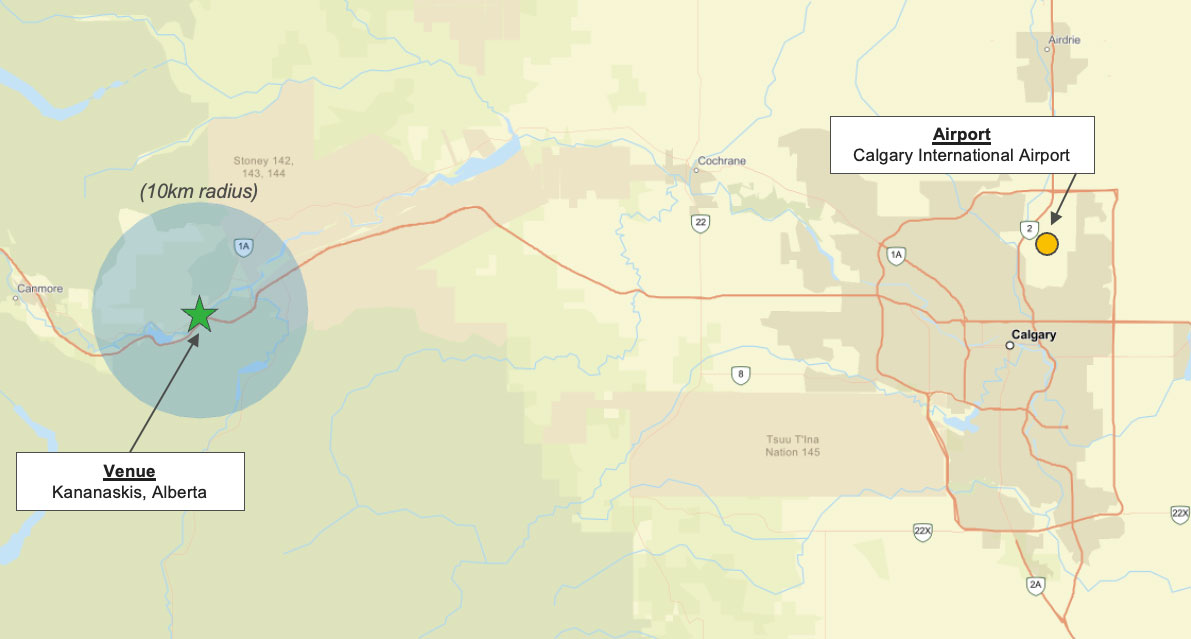
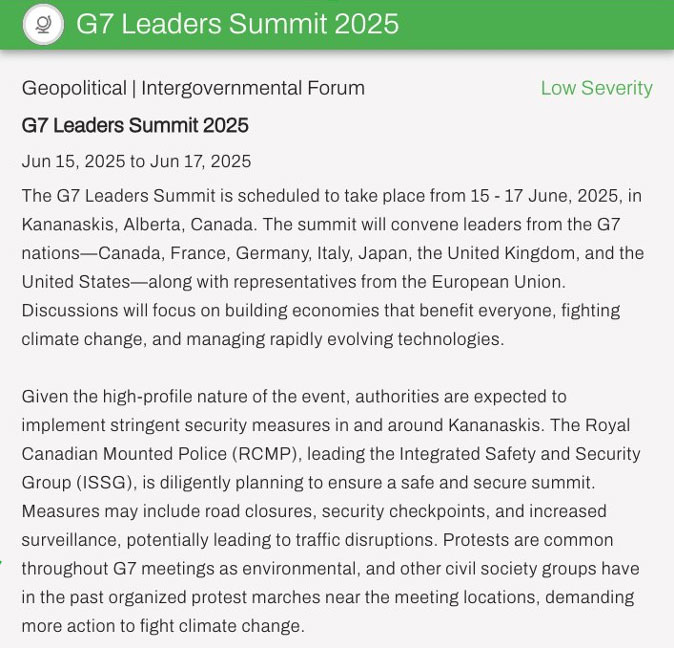
Map of G7 Summit Venue in Kananaskis, Alberta (Canada)
Driving distance from Calgary Int’l Airport to Kananaskis Village is ~101 km ��

Seerist Future Event
Learn more��
Country Overview: Canada
Despite a temporary drop (-6.7%) in Canada’s stability in the immediate aftermath of the 27 April vehicle-ramming attack in Vancouver, PulseAI forecasts stable conditions nation-wide over the next 7 days. Emotions analysis indicated temporary spikes in Fear and Sadness, but Control Risks assesses the late April attack was an isolated incident and not indicative of an elevated terrorism threat in Canada.
Source: Seerist
PulseAI
PulseAI identifies micro-changes in stability and looks for anomalies to alert users to actions that may pose a risk or present an opportunity to their operation. Pulse AI triggered alerts notify analysts of important developments, speed the process of finding and accessing mission-relevant data, and enable analysts to maintain situational awareness. ��
PulseAI History and Trendline
The PulseAI History and Trendline in Canada shows that over the past 60 days, stability has ranged between 70 and 78 points. While the Pulse AI score dropped 6.7% in the immediate aftermath of the vehicle ramming attack in Vancouver on 27 April, Seerist’s seven-day Pulse forecast predicts stability to remain between a score of 73 and 76.��
EventsAI Sentiment
EventsAI Sentiment shows public sentiment across Canada. Seerist recorded a consistent negative public sentiment over the past 60 days driven mostly by unrest. A spike in negative public sentiment on 27 April was recorded after a vehicle-ramming attack into a crowd in Vancouver celebrating a street festival left 11 people dead and dozens injured.��
PulseAI
PulseAI History and Trendline
EventsAI Sentiment




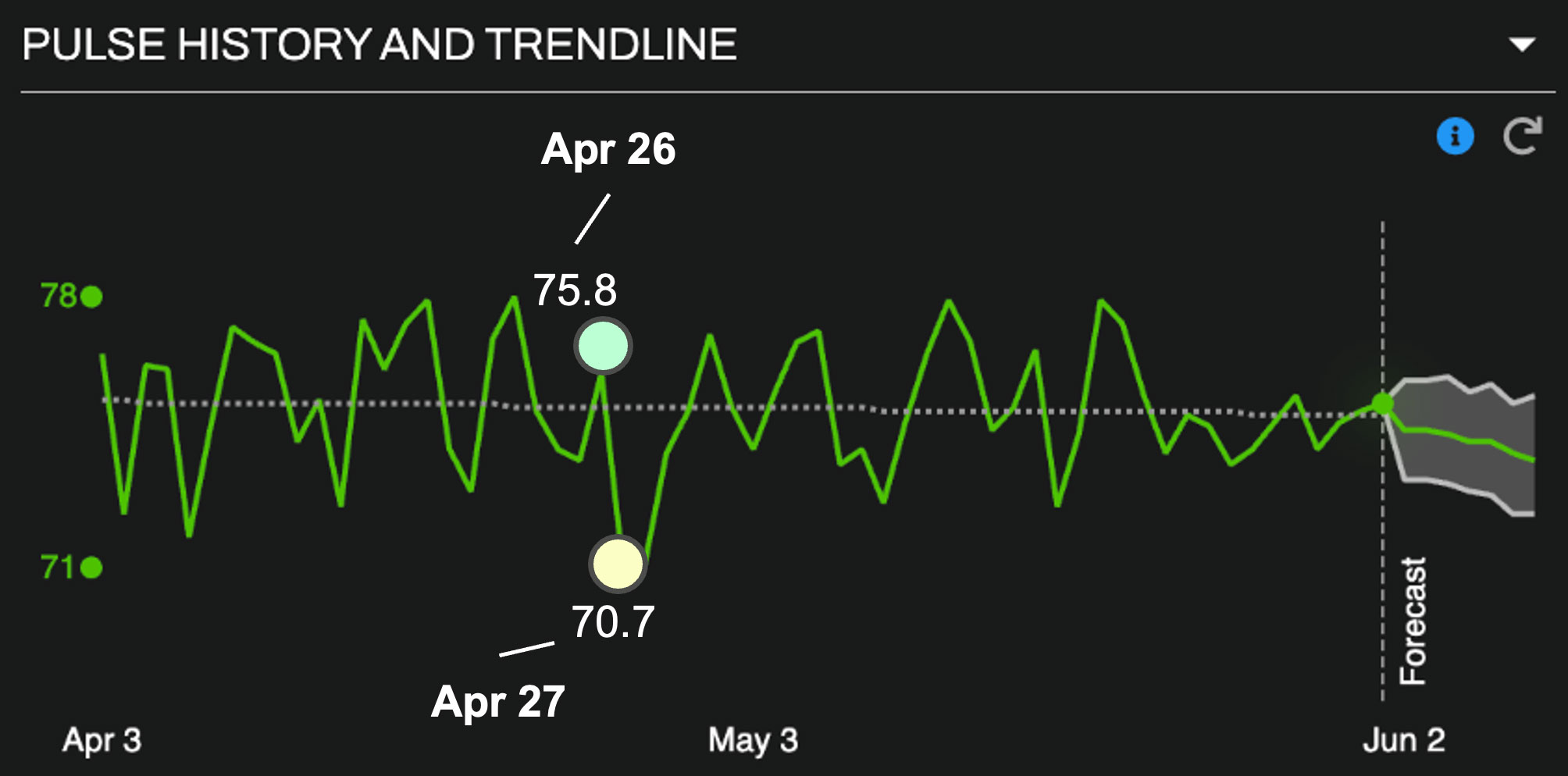
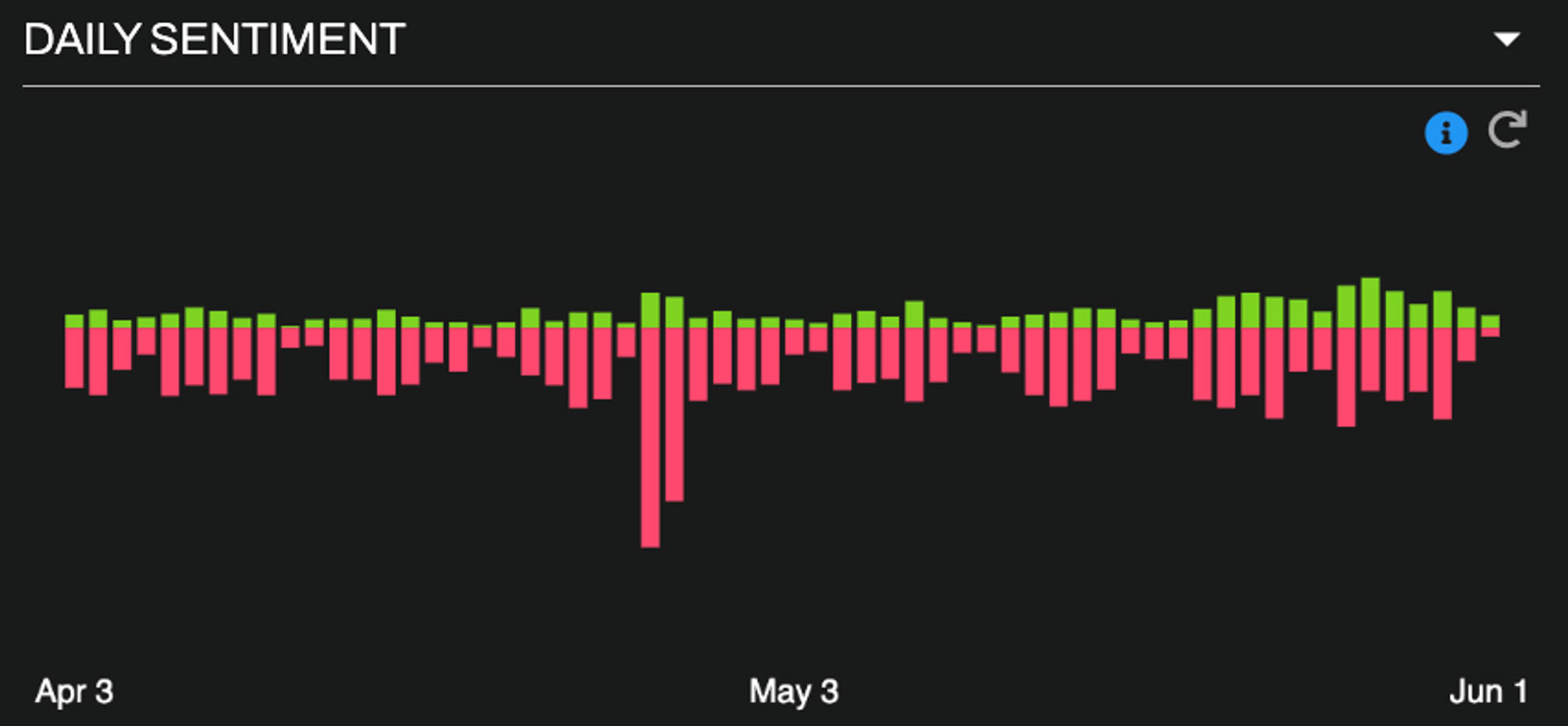

27 Apr: Vancouver vehicle-ramming attack�
EventsAI Emotion
Seerist EventsAI Emotion uses natural language processing to identify and categorize emotions expressed in textual data.
Seerist recorded an increase in Fear and Sadness emotions on 27 April following the Vancouver vehicle-ramming attack.���


27 Apr: Vancouver vehicle-ramming attack�
EventsAI Emotion

EventsAI

EventsAI
Seerist EventsAI shows how event reports can indicate levels of Fear or Sadness depending on the way the report has been portrayed.����

Fear

Sadness

Verified Events Analysis: �Calgary & G7 Summit��
Verified unrest and crime events in Calgary show a higher frequency of low severity events, largely driven by international issues (e.g., U.S. foreign policy, Russia-Ukraine war), concentrated in the downtown area of the city. The G7 venue in Kananaskis lies well outside these areas of reported activity, with proactive security measures (e.g., designated protest zones) intended to allow, but effectively contain, largely symbolic demonstrations in Calgary.�
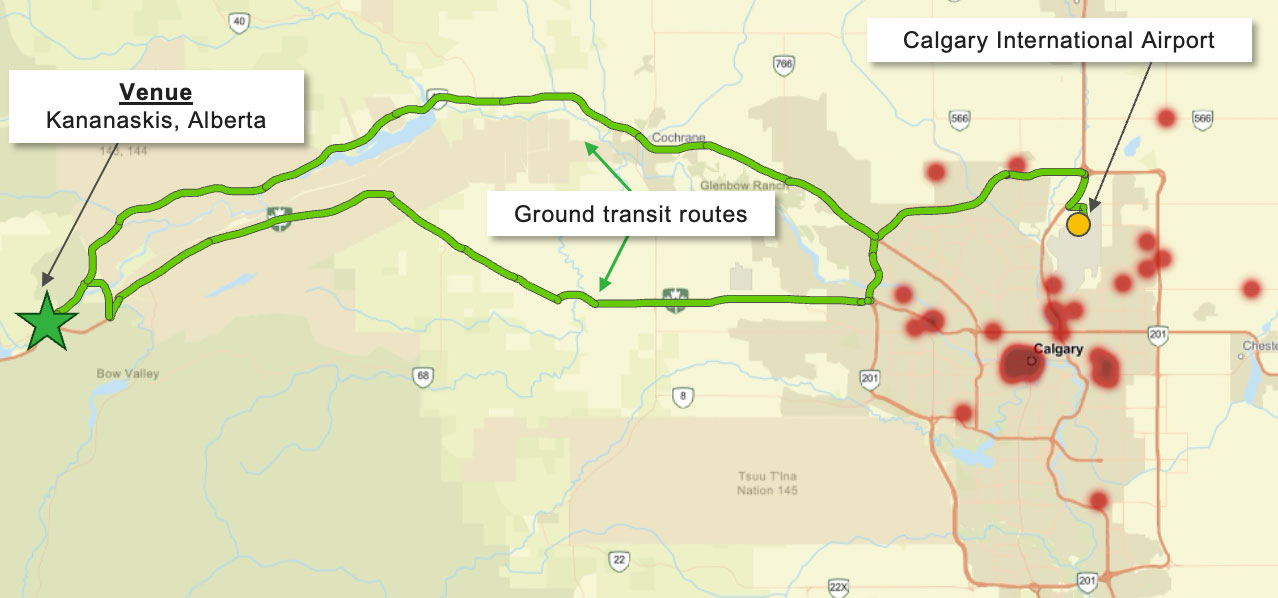
Heat Map of Unrest & Crime VEs Near Calgary & G7 Summit (1 Jun 2024 - 1 June 2025)
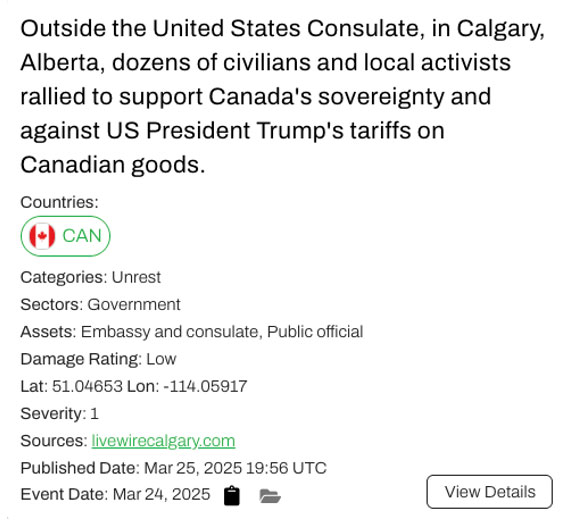
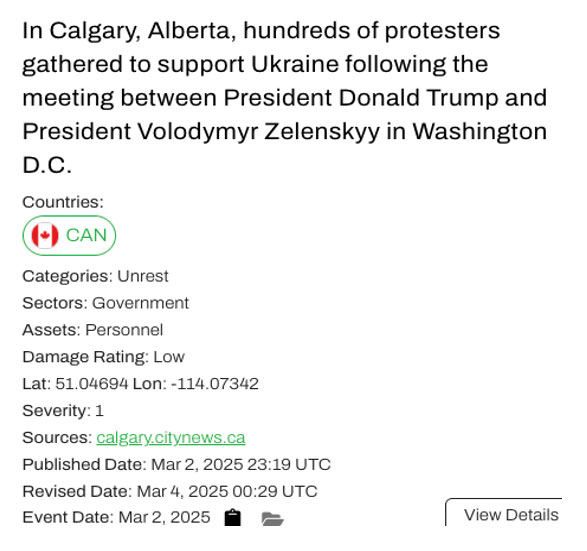
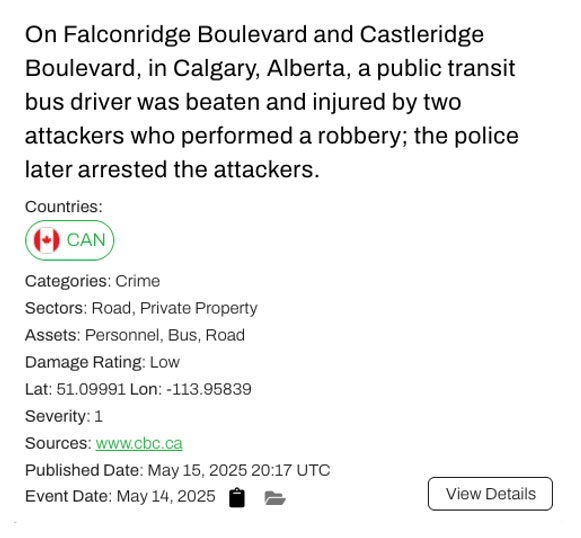
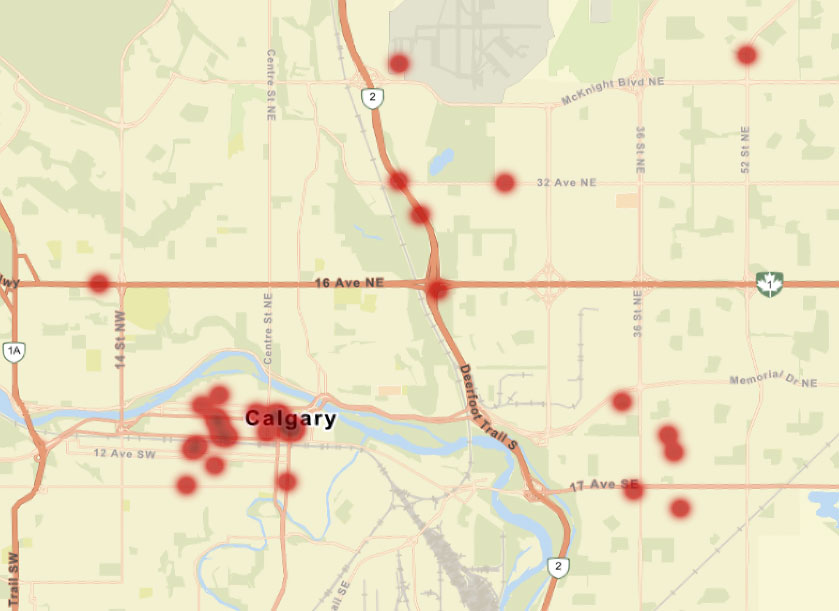
Verified Unrest Events Insights�Most unrest events in Calgary occurred in the downtown area. Key drivers of protests include opposition to the global policies of US President Donald Trump, the conflict in Ukraine, corruption, and local politics. Within the unrest category, protests accounted for 86% of ‘attack type’ activities that largely targeted the government (71%), education (14%), and healthcare (5%) sectors.�
Verified Crime Events Insights�Verified crime events in Calgary included sporadic cases of shootings and assault incidents in public spaces, including at public transit locations. Crime events involving gun/firearms (57%) accounted for the majority of recorded crime ‘attack type’ incidents.��
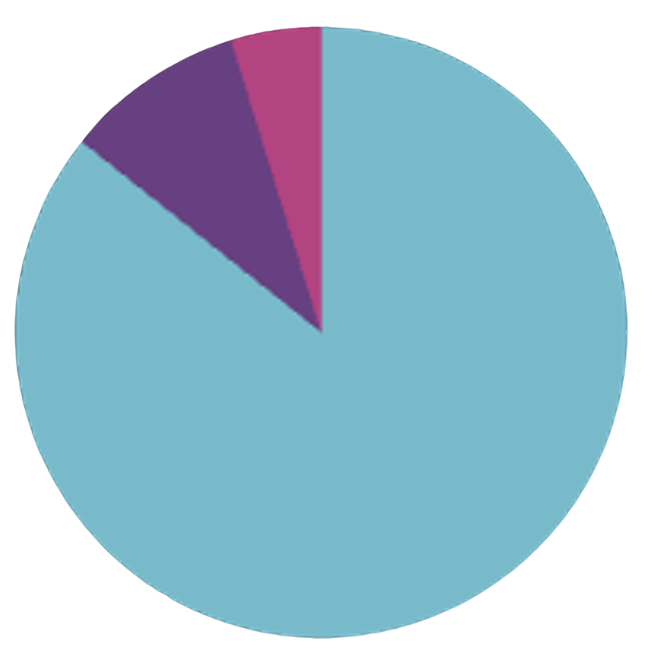
86%
10%
4%
Unrest VEs by Attack Type
Protest (demonstration)
Strike
Sticks/beating
Unrest VEs by Perpetrator
15
10
5
0
Local community groups
Labour/�trade unions
Environ-�mentalists
Security forces
Crime VEs by Attack Type
Gun (firearm)
Sticks/beating
Knife/bladed weapon
Robbery
Crime VEs by Perpetrator
20
10
0
Private property
Law enforcement/�Legal
Entertain-ment
Financial
57%
20%
11%
**Seerist Methodology Note: The number of verified crime events excludes events involving unidentified perpetrators and low-level crimes, such as attacks stemming from personal disputes or minor robberies that do not involve weapons or casualties. �
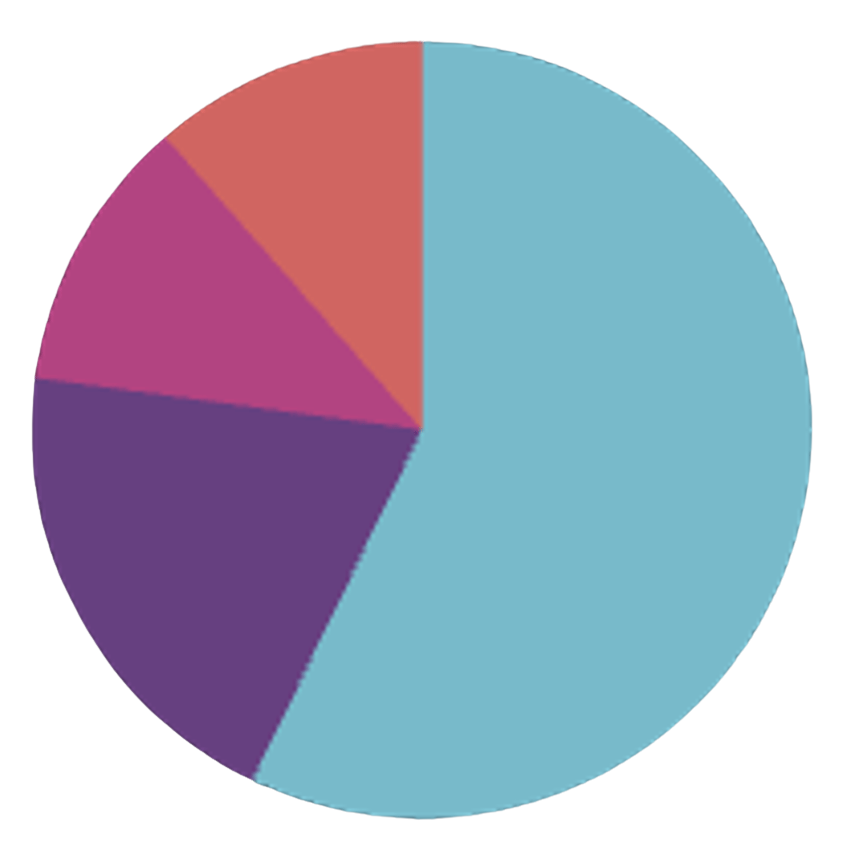
12%
30
Retail
Road

View in-focus VE insights in Calgary

Monitor Security Developments with EventsAI�
Build a custom search with EventsAI to monitor the security environment across Canada ahead of and during the G7 Summit.��

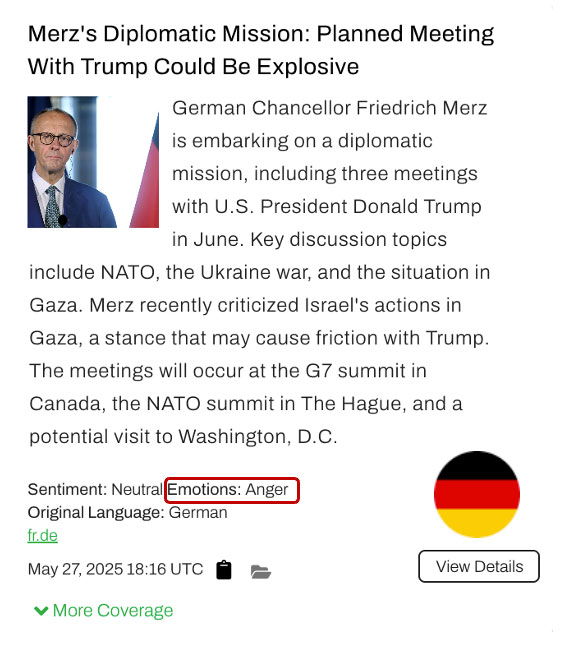
1 of 6
2 of 6
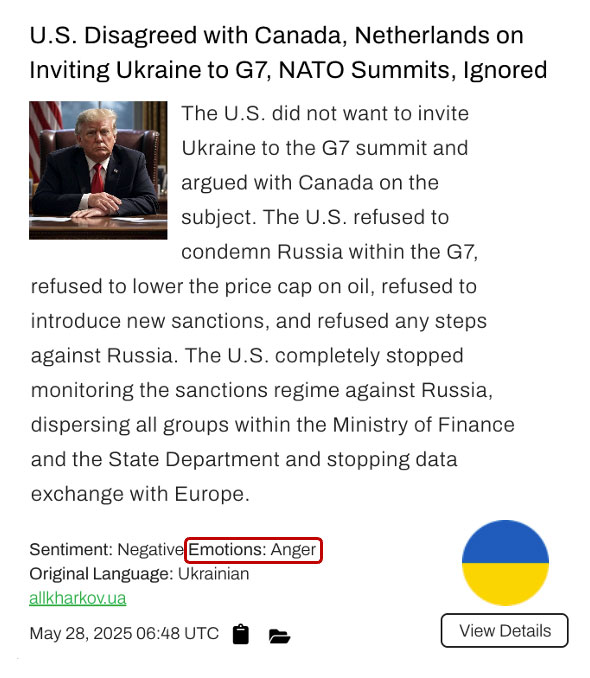
3 of 6
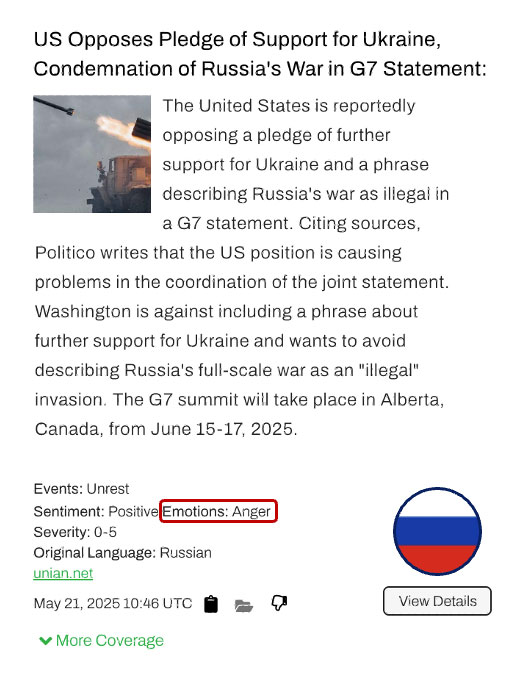
4 of 6
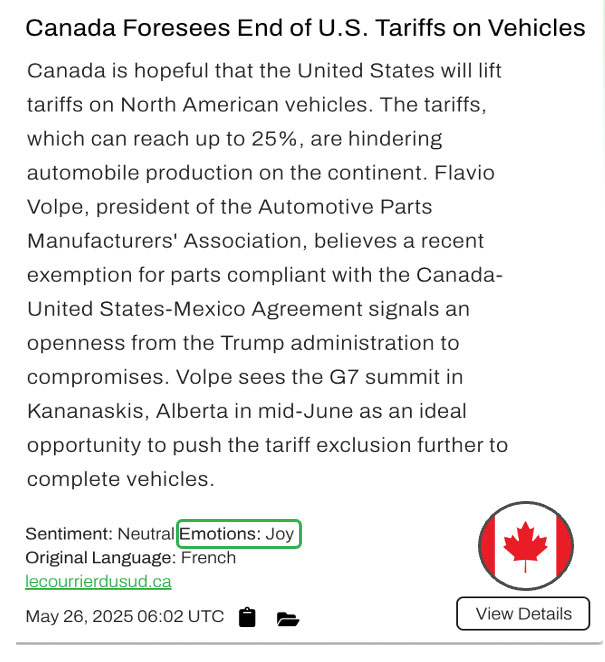
5 of 6
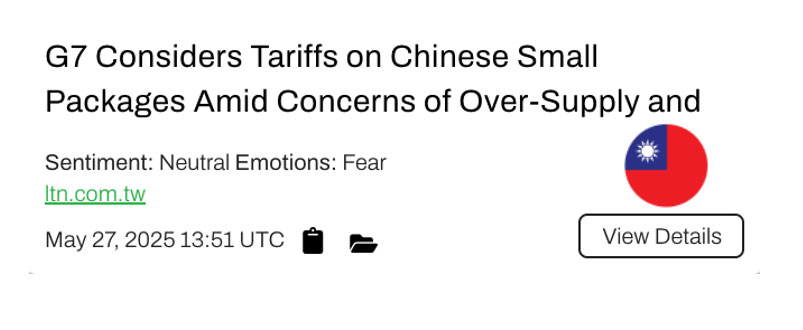
6 of 6
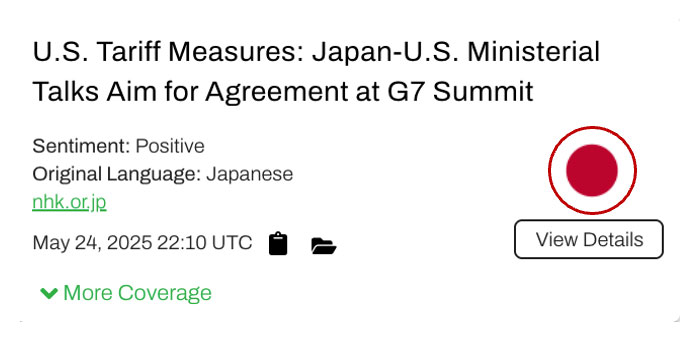
Search Results


Source: Seerist
Source: Seerist
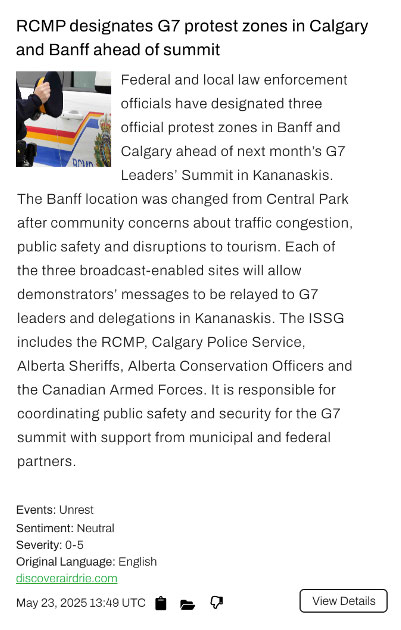
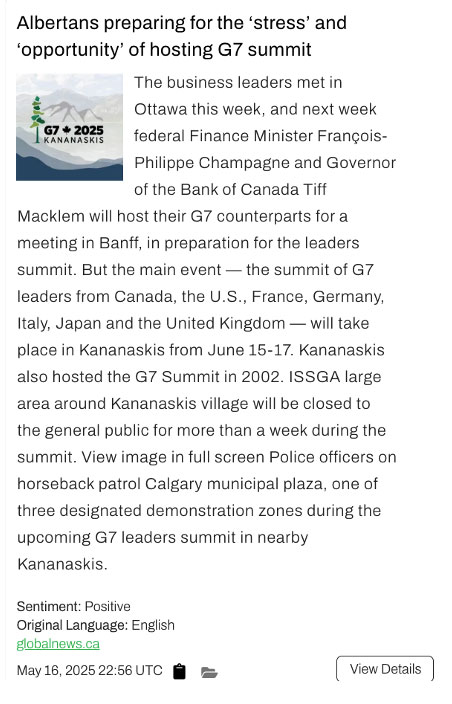
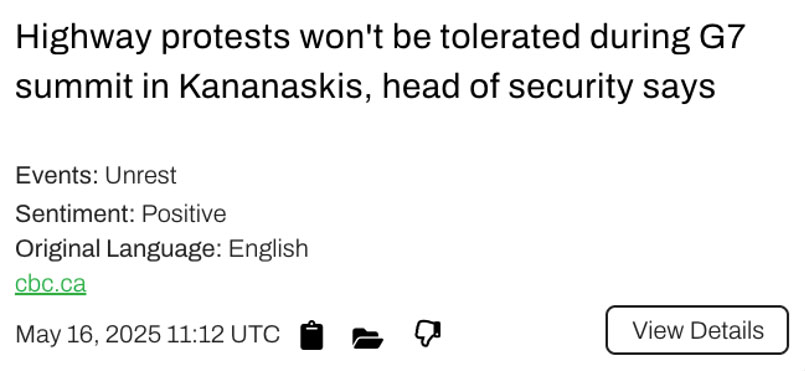
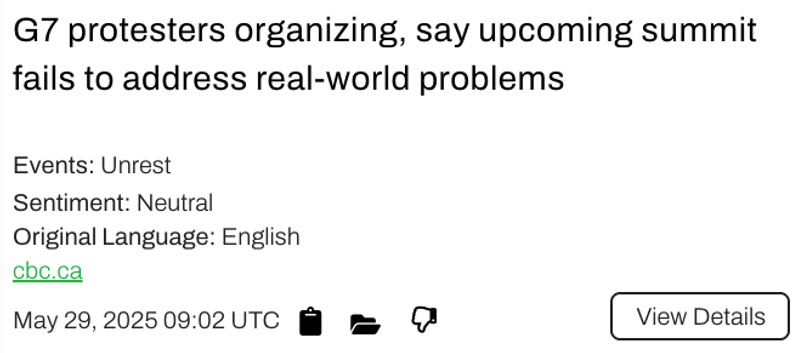
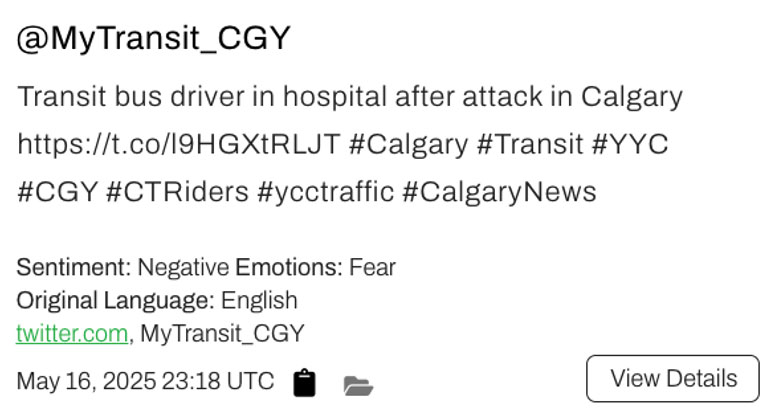
View Seerist’s in-depth analyses on Canada via the search function to gain further context and expert assessments on recent events.�
EventsAI results show near-real time developments for travel, unrest, and disaster across Canada.�


Source: Seerist
Monitor News about the G7 Summit with EventsAI�
Seerist allows users to build a simple search using keywords to find EventsAI stories related to the international summit in the days and weeks before it takes place.
Users can filter search results for language or country of origin to manage misinformation risks or use EmotionsAI to filter for results determined to convey Negative Sentiment with emotions such as Fear or Anger.��

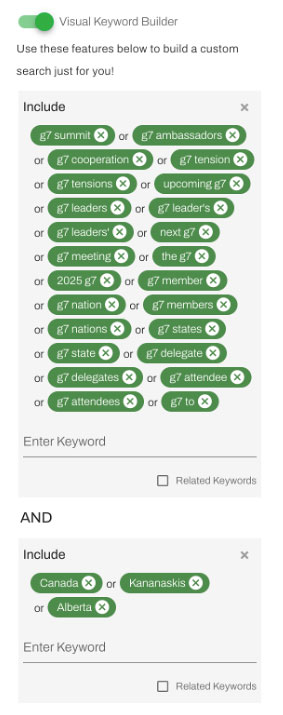
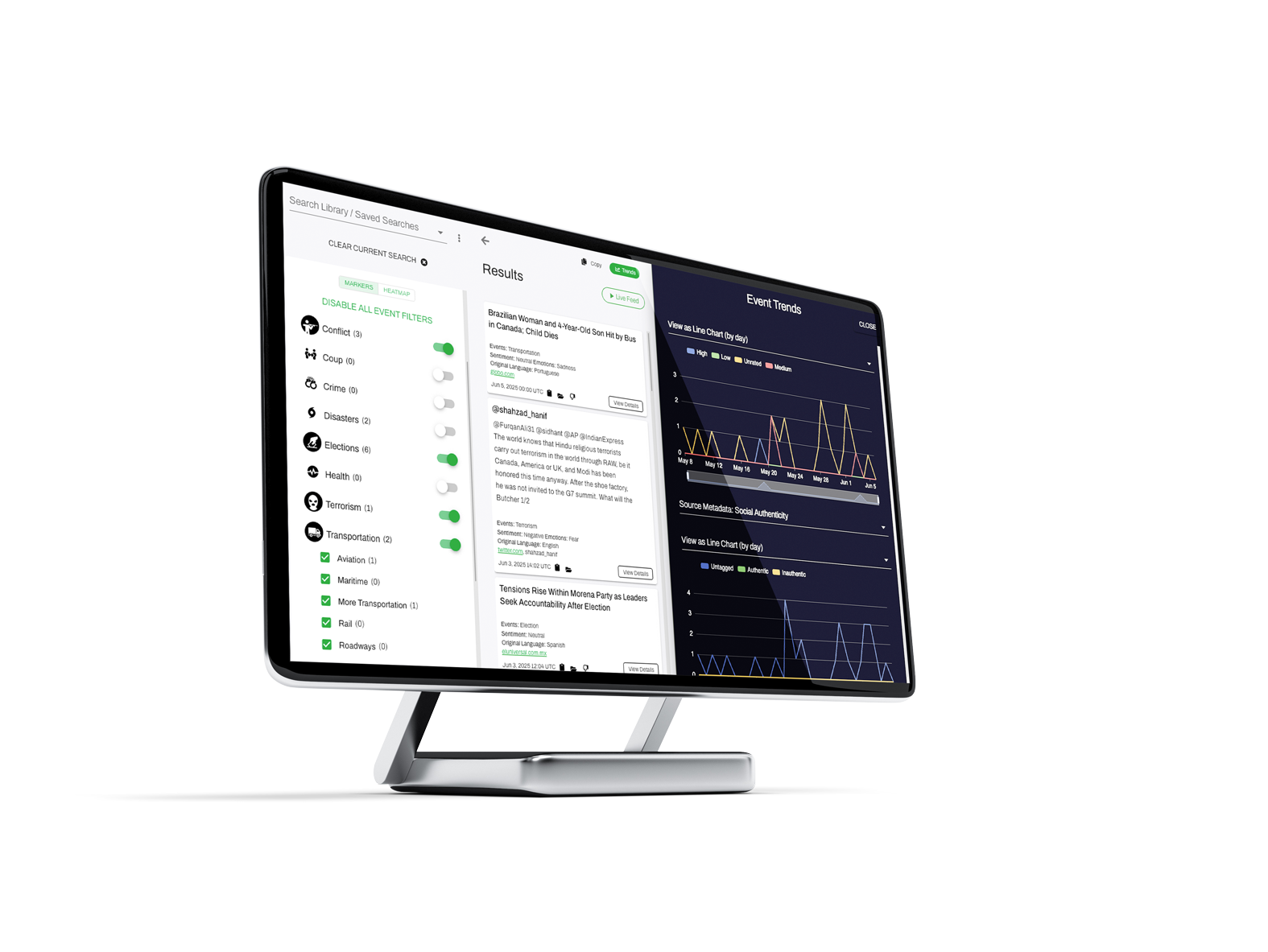
RCMP has designated three protest zones for the G7 Summit��
Municipal Plaza (Geo Coords: 51.04595, -114.05844)
Enoch Park (Geo Coords: 51.041569, -114.057842)
15th Street & McKnight Blvd (Geo Coords: 51.092821, -114.022107)
1
2
3
1.
2.
3.

Control Risks Analysis
Vancouver vehicle ramming reflects threat of low-sophistication attacks by lone perpetrators�
At least 11 people on 26 April were killed when a vehicle rammed into a crowd celebrating a Filipino community festival, Lapu Lapu Day, in Vancouver (British Columbia province). �
This was an isolated incident carried out by an individual with a history of mental illness and is not indicative of an elevated terrorism threat.
Nonetheless, occasional vehicle-ramming incidents over the past decade highlight the threat posed by lone-wolf actors engaging in low-sophistication attacks.
Although candidates paused campaigns, the attack is unlikely to impact the results of the federal election scheduled for 28 April. ���
�
��
Source: “Lapu Lapu killings: Suspect charged with multiple counts of second-degree murder in Vancouver”, CBC �
Read More Analysis
The attack�The attack targeted the Lapu Lapu Day Festival, an event organised annually by Vancouver’s Filipino community to commemorate a 16th century Filipino anti-colonial leader. The perpetrator maneuvered his vehicle around a portable barrier before accelerating into attendees, killing 11 people and injuring dozens. The perpetrator was quickly apprehended, named and charged with eight counts of murder. The Vancouver Police Department (VPD) stated that he had a history of mental health-related illnesses and that it did not believe there was a political or religious motivation.
Threat trends �The lack of clear motivation or group affiliation of the perpetrator suggests that the attack is not indicative of any increased intent by extremists to target specific events or demographics in Canada. Nonetheless, sporadic incidents over the past decade show that the country is not immune to wider global trends of lone-wolf threat actors exploiting tactics that require little sophistication – such as vehicle ramming or knife assaults. These include a vehicle-ramming attack in 2018 by a misogynist far-right incel (“involuntary celibate”) ideology in Toronto (Ontario province), which killed ten people and injured 16; another such incident in 2021 against a Muslim Canadian family in London (Ontario) that killed four and was motivated by Islamophobia and white supremacist beliefs; and a 2022 mass stabbing attack in which 11 people were killed and 17 injured across various locations in Saskatchewan province.
Such incidents are more difficult for security services to identify and disrupt than more sophisticated plots that require a degree of co-ordination or preparation (such as explosive attacks). They are also often not preceded by clear warning signs; although the perpetrator was known to the VPD and mental health services, a risk assessment conducted by the VPD ahead of the event had apparently not identified any clear or credible threats.
The election �There is no indication that the attack was linked to the federal election held on 28 April and it is unlikely to have a significant impact on the results. All three main party leaders largely cancelled their campaign events on 27 April. None attempted to politicise the incident and the lack of clear motivations means that it is unlikely to affect voter preferences. Polls still show the incumbent Liberal Party as the frontrunners in what is likely to be a close election. �


Explore Now

Learn more about delivering the trustworthy insights you need, right when you need them.
Discover Seerist Today
The foresight to get ahead of what may come.

The insights with the most impact.

Accelerate speed to decision.

Future Events cover one-off or recurring events that could cause operational disruption, heightened security threats or result in significant political decisions. Found on the dedicated country page, all calendar events are given a rating for their potential severity, in addition to assessing impact types such as ‘unrest’ and ‘transportation’.�


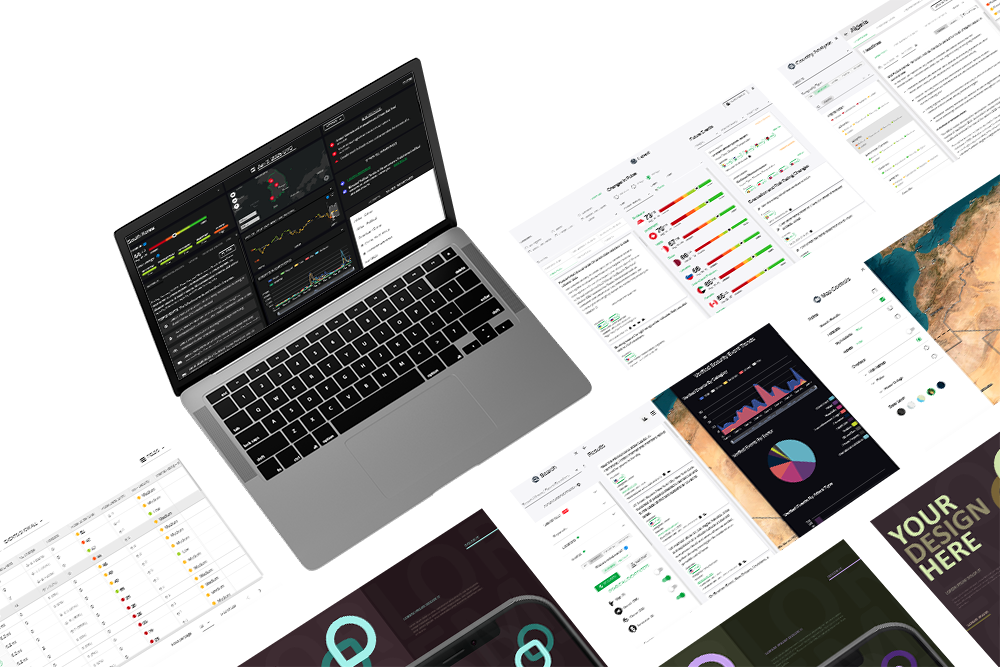
Discover the Seerist Solution.
Learn more about delivering the trustworthy insights you need, right when you need them.

Explore Now